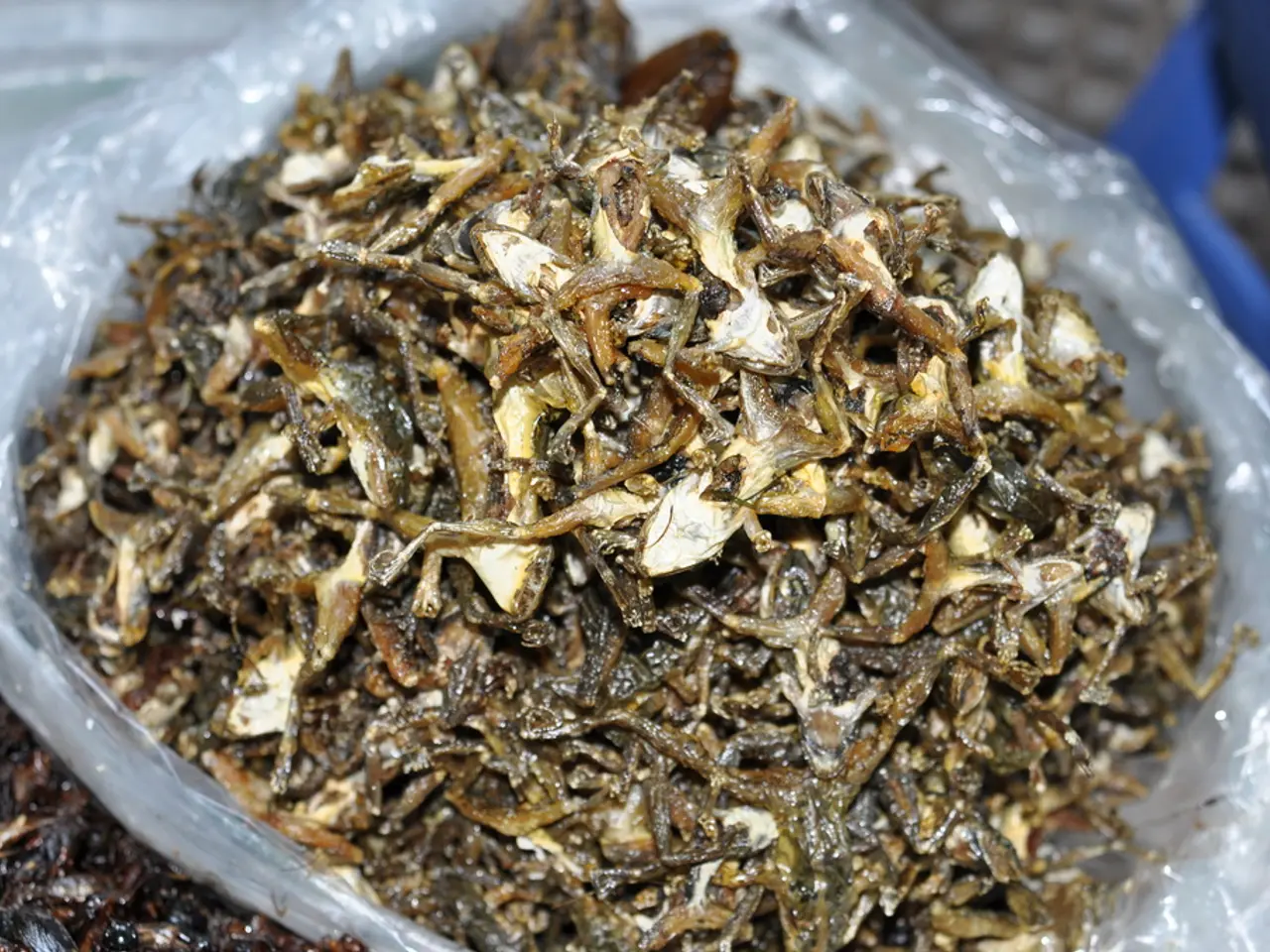Dry eye treatment: Exploring fish oil varieties, advantages, and potential hazards
Fish oil, rich in omega-3 fatty acids, has been a subject of interest in the management of dry eyes. However, the evidence supporting its effectiveness is inconclusive.
The American Heart Association (AHA) recommends consuming at least two servings of fatty fish each week, such as salmon, sardines, herring, albacore tuna, mackerel, and lake trout, which are all sources of fish oil. The National Institutes of Health (NIH) advises that increasing fatty acid levels in the body can only be achieved through consuming EPA and DHA from food sources or supplements.
Research suggests that the omega-3s present in fish oil may help reduce inflammation, a problem that can lead to dry eyes. However, a study found no significant differences in the improvement of dry eye symptoms between a group taking omega-3 supplements and a placebo group receiving olive oil in identical capsules. Another study found that omega-3 supplements were no more effective than a placebo for treating chronic dry eye symptoms.
On the other hand, a study using a high dosage of 2000 mg of EPA and 1000 mg of DHA found that EPA and DHA supplementation resulted in a significant improvement in dry eye symptoms compared to a placebo of linoleic acid.
It's worth noting that flaxseed oil, while containing an omega-3 called alpha-linolenic acid (ALA), does not contain EPA or DHA.
While fish oil is generally safe, it may pose risks for certain individuals, particularly those taking Warfarin or other blood-thinning medications. High doses of EPA and DHA may suppress inflammatory responses and decrease the function of the immune system. Additionally, some fish, such as shark, swordfish, king mackerel, and tilefish, contain high levels of mercury, making them less suitable choices for regular consumption.
The American Academy of Ophthalmology (AAO) states that omega-3 oils may improve the function of the meibomian glands, which produce the oily layer of tears. However, the evidence is not conclusive enough to definitively recommend fish oil supplements for dry eye treatment alone.
In summary, while fish oil may have some potential for symptom relief and adjunctive benefits, particularly when combined with other compounds, current high-quality evidence does not robustly support it as an effective standalone treatment for dry eyes. Continued research is needed to clarify its role and optimal formulations for dry eye management.
[1] ConsumerLab. (2021). Fish Oil for Dry Eye. [online] Available at: https://www.consumerlab.com/reviews/fish_oil_for_dry_eye/fish_oil/
[2] American Academy of Ophthalmology. (2020). Fish Oil. [online] Available at: https://www.aao.org/eye-health/diseases/fish-oil
[3] Lee, Y. S., et al. (2021). Omega-3 Fatty Acids for the Management of Dry Eye Disease. [online] Available at: https://www.ncbi.nlm.nih.gov/pmc/articles/PMC8126967/
[4] Kang, S. H., et al. (2020). The Effect of Omega-3 Fatty Acids on Dry Eye Disease: A Systematic Review and Meta-Analysis of Randomized Controlled Trials. [online] Available at: https://www.ncbi.nlm.nih.gov/pmc/articles/PMC7299756/
- The treatment of dry eyes may not be effectively addressed by relying solely on fish oil supplements, as science has not provided robust evidence in support of their use.
- Personas seeking treatment for dry eyes should consider incorporating fish oil, rich in omega-3 fatty acids, into their diet, or opt for mental health supplements containing omega-3s, as recommended by the National Institutes of Health (NIH).
- Dry eye symptoms might not improve significantly for treaters if they rely on omega-3 supplements instead of following established treatments, as indicated by some studies.
- Although omega-3 supplements, such as those derived from fish oil, have shown little efficacy in treating chronic dry eye symptoms, they could potentially provide health-and-wellness benefits beyond eye health.
- Mental health, fitness-and-exercise, skin-care, and nutrition supplements containing omega-3 fatty acids might offer additional benefits for a person's overall health, apart from supporting the management of dry eyes.
- Adding naive supplements containing EPA and DHA, like those found in fatty fish, to a healthy diet may help caring for one's eyes, according to The American Academy of Ophthalmology (AAO).
- CBD, a compound that has gained popularity in the health-and-wellness industry, may work synergistically with fish oil to enhance the overall treatment of dry eyes, although more research is needed.8.omega-3 rich oils, such as fish oil, may help in reducing inflammation, which is associated with dry eyes; however, the efficacy of treatment for dry eye symptoms varies, as seen in some studies.
- Consuming a balanced diet that includes fish oil provides essential nutrients vital for maintaining overall health, fitness-and-exercise, mental health, and skin care, alongside the potential benefits for dry eyes.
- Relying on fish oil, and its derivatives as a standalone treatment may not be the best approach for dry eye management, but it could still play a role in complementary treatment strategies, contributing to symptom relief and improved overall eye health.




